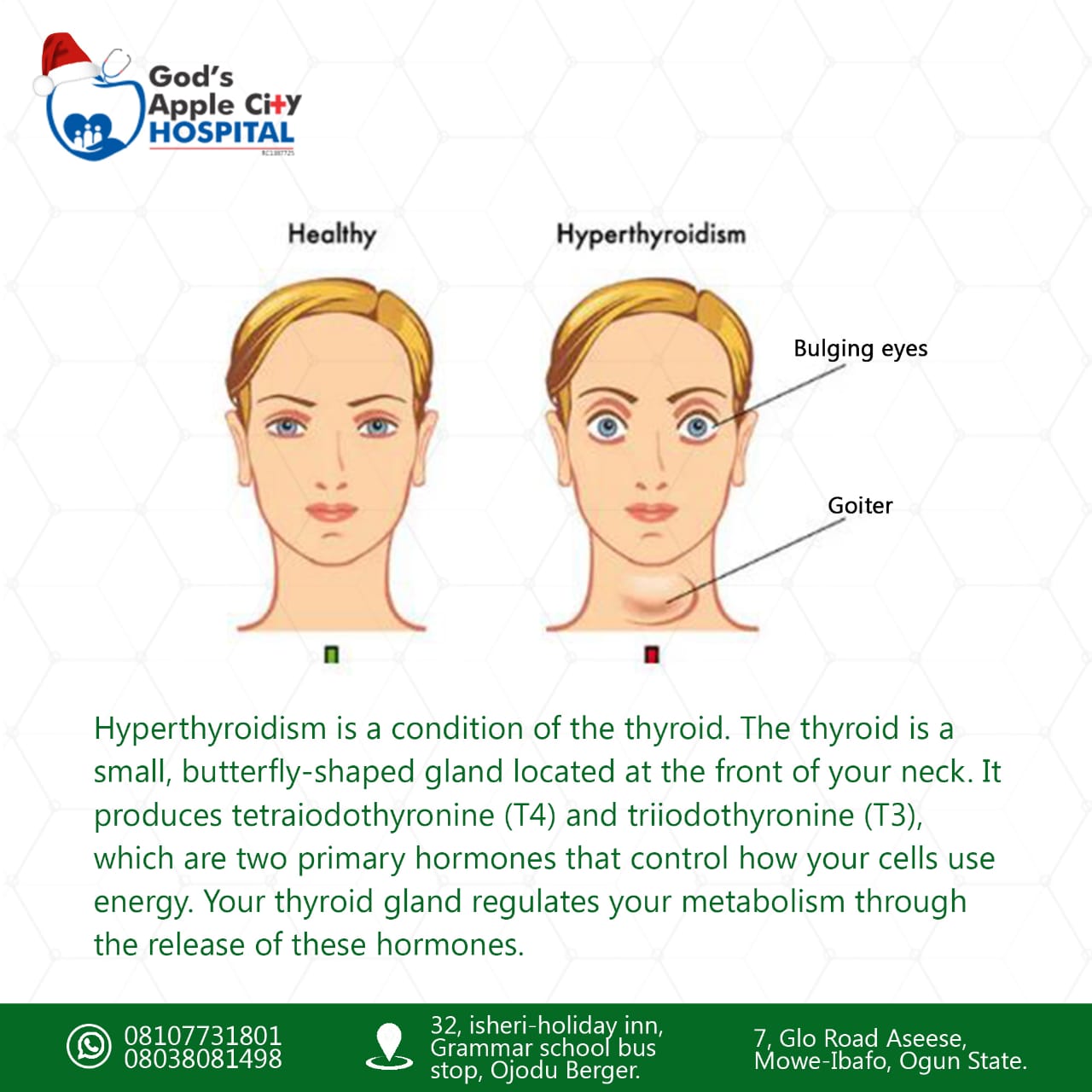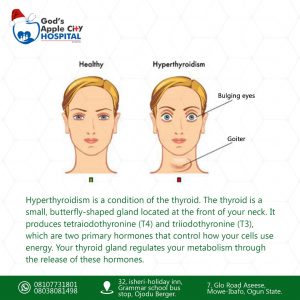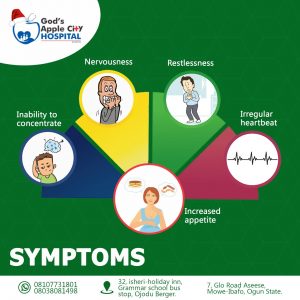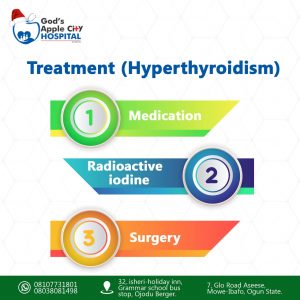Hyperthyroidism
Hyperthyroidism is a condition of the thyroid. The thyroid is a small, butterfly-shaped gland located at the front of your neck. It produces tetraiodothyronine (T4) and triiodothyronine (T3), which are two primary hormones that control how your cells use energy. Your thyroid gland regulates your metabolism through the release of these hormones.
Hyperthyroidism occurs when the thyroid makes too much T4, T3, or both. Diagnosis of overactive thyroid and treatment of the underlying cause can relieve symptoms and prevent complications.
What causes hyperthyroidism?
A variety of conditions can cause hyperthyroidism. Graves’ disease, an autoimmune disorder, is the most common cause of hyperthyroidism. It causes antibodies to stimulate the thyroid to secrete too much hormone. Graves’ disease occurs more often in women than in men. It tends to run in families, which suggests a genetic link. You should tell your doctor if your relatives have had the condition.
Other causes of hyperthyroidism include:
- excess iodine, a key ingredient in T4 and T3
- thyroiditis, or inflammation of the thyroid, which causes T4 and T3 to leak out of the gland
- tumors of the ovaries or testes
- benign tumors of the thyroid or pituitary gland
- large amounts of tetraiodothyronine taken through dietary supplements or medication
What are the symptoms of hyperthyroidism?
High amounts of T4, T3, or both can cause an excessively high metabolic rate. This is called a hypermetabolic state. When in a hypermetabolic state, you may experience a rapid heart rate, elevated blood pressure, and hand tremors. You may also sweat a lot and develop a low tolerance for heat. Hyperthyroidism can cause more frequent bowel movements, weight loss, and, in women, irregular menstrual cycles.
Visibly, the thyroid gland itself can swell into a goiter, which can be either symmetrical or one-sided. Your eyes may also appear quite prominent, which is a sign of exophthalmos, a condition that’s related to Graves’ disease.
Other symptoms of hyperthyroidism include:
- increased appetite
- nervousness
- restlessness
- inability to concentrate
- weakness
- irregular heartbeat
- difficulty sleeping
- fine, brittle hair
- itching
- hair loss
- nausea and vomiting
- breast development in men
The following symptoms require immediate medical attention:
- dizziness
- shortness of breath
- loss of consciousness
- fast, irregular heart rate
Hyperthyroidism can also cause a trial fibrillation, a dangerous arrhythmia that can lead to strokes, as well as congestive heart failure.
How do doctors diagnose hyperthyroidism?
Your first step in diagnosis is to get a complete medical history and physical exam. This can reveal these common signs of hyperthyroidism:
- weight loss
- rapid pulse
- elevated blood pressure
- protruding eyes
- enlarged thyroid gland
Other tests may be performed to further evaluate your diagnosis. These include:
Cholesterol test
Your doctor may need to check cholesterol level. Low cholesterol can be a sign of an elevated metabolic rate, in which your body is burning through cholesterol quickly.
T4, free T4, T3
These tests measure how much thyroid hormone (T4 and T3) is in your blood.
Thyroid stimulating hormone level test
Thyroid stimulating hormone (TSH) is a pituitary gland hormone that stimulates the thyroid gland to produce hormones. When thyroid hormone levels are normal or high, your TSH should be lower. An abnormally low TSH can be the first sign of hyperthyroidism.
Triglyceride test
Your triglyceride level may also be tested. Similar to low cholesterol, low triglycerides can be a sign of an elevated metabolic rate.
Thyroid scan and uptake
This allows your doctor to see if your thyroid is overactive. In particular, it can reveal whether the entire thyroid or just a single area of the gland is causing the overactivity.
Ultrasound
Ultrasounds can measure the size of the entire thyroid gland, as well as any masses within it. Doctors can also use ultrasounds to determine if a mass is solid or cystic.
CT or MRI scans
A CT or MRI can show if a pituitary tumor is present that’s causing the condition.
How to treat hyperthyroidism
Medication
Antithyroid medications, such as methimazole (Tapazole), stop the thyroid from making hormones. They are a common treatment.
Radioactive iodine
Radioactive iodine is given to over 70 percent of U.S. adults with hyperthyroidism, according to the American Thyroid Association. It effectively destroys the cells that produce hormones.
Common side effects include dry mouth, dry eyes, sore throat, and changes in taste. Precautions may need to be taken for a short time after treatment to prevent radiation spread to others.
Surgery
A section or all of your thyroid gland may be surgically removed. You will then have to take thyroid hormone supplements to prevent hypothyroidism, which occurs when you have an underactive thyroid that secretes too little hormone. Also, beta-blockers such as propranolol can help control your rapid pulse, sweating, anxiety, and high blood pressure. Most people respond well to this treatment.
What you can do to improve symptoms
Eating a proper diet, with a focus on calcium and sodium, is important, especially in preventing hyperthyroidism. Work with your doctor to create healthy guidelines for your diet, nutritional supplements, and exercise.
Hyperthyroidism can also cause your bones to become weak and thin, which can lead to osteoporosis. Taking vitamin D and calcium supplements during and after treatment can help strengthen your bones. Your doctor can tell you how much vitamin D and calcium to take each day.
.
.
.
.
.
.
.
.
https://web.facebook.com/Godsapplecity
read other blogs




